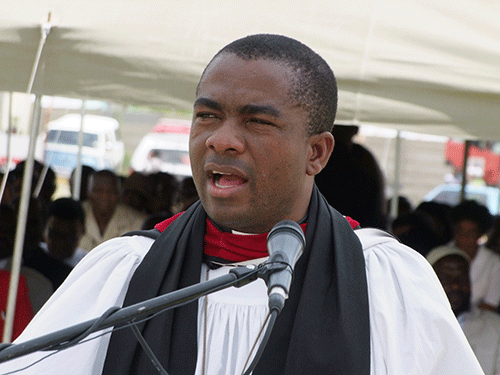Edward Mumbuu Jnr
For as long as land remains an elusive dream for many Namibians while the former oppressors tightly grip the resource, the struggle is far from over.
This is according to the bishop of the Reformed Evangelical Anglican Church of Namibia (REACH-Namibia), Lukas Katenda, in a recent interview with Nampa.
The man of the cloth reflected on Namibia’s 32 years of independence, mainly focusing on lack of access to land, oil discovery and the role of the church post-independence.
He said with a two-thirds majority enjoyed by the ruling party for over 25 years – voted for by primarily black landless Namibians – the blame can no longer be shifted to the colonial German and apartheid regimes that used laws to empower their kith and kin at the expense of Namibians.
“The land is the reason our forefathers, parents and even we participated in the liberation struggle. It was the land issue. When we see foreign landlords while our people are living in informal settlements, fighting for small portions of land while we have large tracts owned by a few, it is disheartening,” Katenda lamented.
Around 70% of Namibia’s farmland is owned by white people [previously advantaged Namibians].
“I am very angry about it. We need to share the land. All Namibians deserve a place to call home,” he said.
The outspoken clergyman also shared his views on the discovery of oil on the Namibian coast, a topic that has divided public opinion.
President Hage Geingob is on record saying “the oil is not legally ours” as the government only owns a 10% stake in projects involving the country’s natural resources.
Instability in oil-producing states like Nigeria, Angola and Mozambique has led to human rights abuses, outright theft, environmental degradation and security threats – which some Namibians fear.
Katenda is pessimistic that just like other resources in mineral-rich Namibia, oil too might only benefit a select few.
“We have seen what fish is doing to us and obviously oil can go in the same direction,” he said.
The bishop conceded that with an elected government in place, the church’s role is largely confined to pulpits, altars and sanctuaries.
However, the wait-and-see approach by churches under the pretext of political correctness has only inflicted more harm than good.
“The church needs to come out of its closet, raise its voice even louder and call the government to the constitutional obligation which is the welfare of the Namibian people,” he said.
Katenda then looked inwards, saying there is a leadership vacuum in the modern-day church and by extension, the country.
“Each generation requires its leadership, people of calibre with a vision and ability to address these matters without fear or favour,” he said. – Nampa



